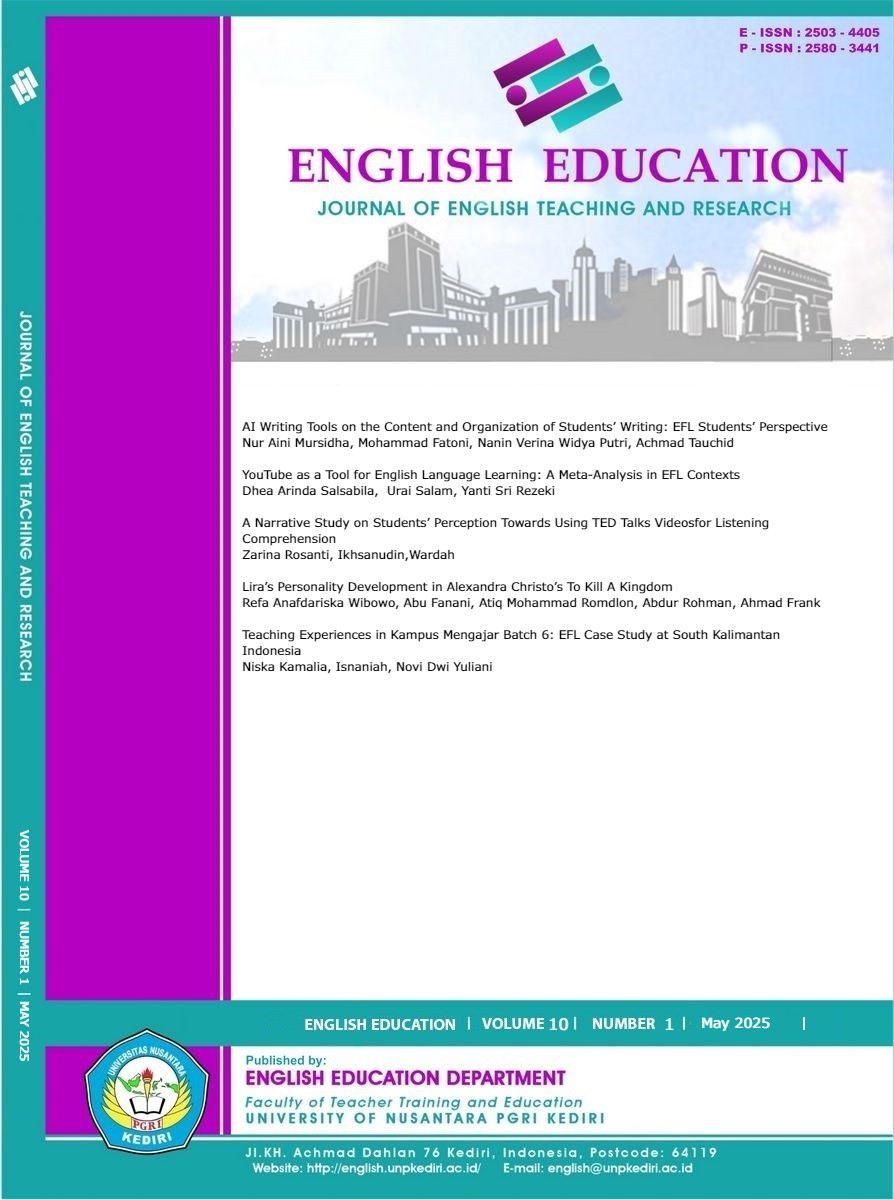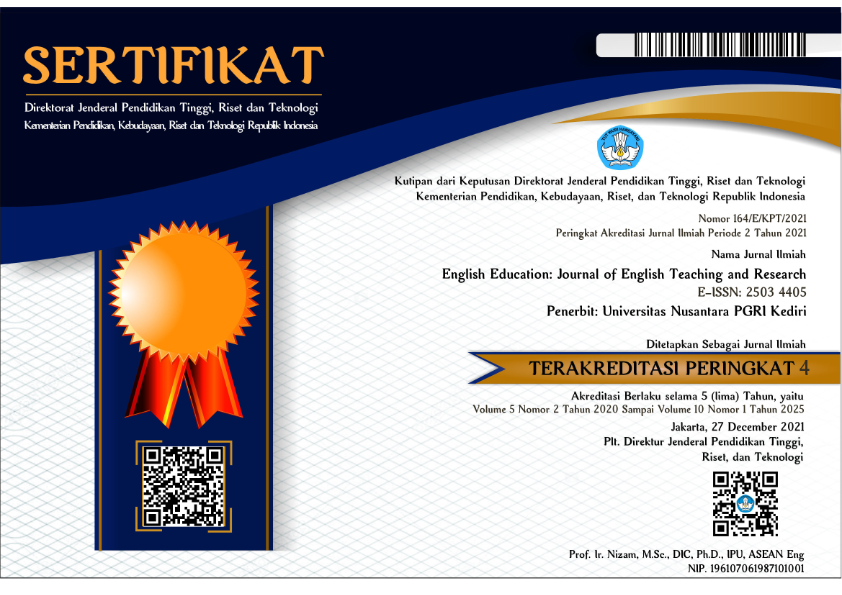Teaching Experiences in Kampus Mengajar Batch 6
EFL Case Study at South Kalimantan Indonesia
DOI:
https://doi.org/10.29407/jetar.v10i1.23717Keywords:
English Teaching, Kampus Mengajar, Kampus Merdeka, teaching experiences, Kampus Merdeka, Kampus Mengajar, English teachingAbstract
This studywas conducted to explore and understand the experiences of students in joining and undergoing the Kampus Mengajar program at schools in South Kalimantan Province and their experience in teaching English during their participation on that program. This research employed a qualitative approach in case study method with twelve participants who were university students in South Kalimantan Province who took part in Kampus Mengajar Batch 6 Program. The main source of data was an online open-ended questionnaire within thirty-one questions and documentation in form of pictures from participants as evidence that related to the research information. The data were analysed by using the thematic analysis, using two theories; the Experiential Learning Theory and Adult Learning Theory. The finding show that the program involved three preparatory stages, including registration, selection, and pre-assignment processes, before students were deployed to schools. Participants conducted school surveys to assess the condition of facilities, teacher quality, and student comprehension. While most participants did not encounter major challenges, those who did were able to develop both hard and soft skills. Regardless of their academic backgrounds, the participants displayed strong enthusiasm for teaching English and used creative methods to enhance student engagement. The program enabled them to apply their academic knowledge in real teaching environments, contributing over three hours of instruction per week. The data revealed that most of the respondents identified the substantial positive effects of Kampus Mengajar Batch 6, particularly in stimulating change in students' literacy and numeracy skills. Meanwhile, the program encouraged substantial contributions to the Indonesian education system, with the respondents asserting transformative influences on their professional development as well as on the institutional capacity of partner schools.
Downloads
References
Anugrah, T. M. F. (2021). Implementasi Pelaksanaan Program Kampus Mengajar Angkatan 1 Terdampak Pandemi Covid-19 (Studi Kasus SDS ABC Jakarta Utara ). Akselerasi: Jurnal Ilmiah Nasional, Vol.3, No.3
Braun, V., & Clarke, V. (2012). Research Designs: Quantitative, Qualitative, Neuropsychological, and Biological (1st ed.). American Psychological Association.
Braun, V., & Clarke, V. (2006). Using Thematic Analysis in Psychology. Qualitative Research in Psychology, 3(2), 77-101. 10.1191/1478088706qp063oa
Direktorat Jenderal Pendidikan Tinggi, Riset, dan Teknologi. (2023). Buku Panduan Kampus Mengajar Angkatan 6 Tahun 2023 https://pusatinformasi.kampusmerdeka.kemdikbud.go.id/hc/id/articles/21879218405273-Buku-Panduan-Kampus-Mengajar-Angkatan-6
Fachrurrazy. 2011. Teaching english as a foreign language for teachers in Indonesia. Malang: UM Press. Finocchiaro, M. & Brumfit, C. 1983. The Functional-Notional Approach. New York, NY: Oxford University Press.
Goor. J.V.D, Sools A.M, and Westerhof, G.B. (2020). The Emergence of Meaning From Meaningful Moments in Life. Journal of Humanistic PsychologyOnlineFirst, October 28, 2020.
Hamalik, Oemar. 1992. Psikologi Belajar Mengajar. Bandung : Sinar Baru
Algesindo.
Hargood, Charlie, and Stephen Peckham. 2017. Soft Skills for the Digital Age. London: Routledge.
Heriyanto. (2018). Thematic Analysis sebagai Metode Menganalisa Data untuk Penelitian Kualitatif. ANUVA, 2(3), 317-324. 10.14710/anuva.2.3.317-324
Iriawan, Sandi Budi, and Asep Saefudin, Buku Saku Utama Aktivitas Mahasiswa Program Kampus Mengajar 2021, Kementerian Pendidikan Dan Kebudayaan, 2021
Isnaniah, I., & Ningsih, R. P. (2022). Digital Literacy Level and English Language Proficiency of College Students in Banjarmasin to Support Independent Learning Campus in the Technological Era 4.0. LET: Linguistics, Literature and English Teaching Journal, 12(2), 286–306. https://doi.org/10.18592/let.v12i2.7261
Kahneman, D. (2000). “Experienced utility and objective happiness: a moment-based approach,” in Choices, Values and Frames, eds D. Kahneman and A. Tversky (New York, NY: Cambridge University Press).
Kementrian Pendidikan dan Kebudayaan. (2021). Buku Saku Utama Aktivitas Mahasiswa Program Kampus Mengajar 2021. https://ditpsd.kemdikbud.go.id/upload/filemanager/download/buku%20saku% 20utama%20kampus%20mengajar_10.pdf
Knowles, M.S., Holton, E.F., Swanson, R.A. (2005). The Adult Learner: The Definitive Classic in Adult Education and Human Resource Development (6th ed.). Elsivier Inc.
Kolb, D. (2015). Experiential Learning Experience as the Source of Learning and Development (2nd ed.). New Jersey: Pearson Education Inc.
Maslow, AH * .Kata Pengantar Teori Motivasi. Kedokteran Psikosomatik 5(1):hal 85-92, Januari 1943.
Mcleod, S. (2017). Kolb’s Learning Styles and Experiential Learning Cycle. https://www.simplypsychology.org/learning-kolb.html
Pertiwi, Y., Iswari, M., & Daharnis. (2022). PERSPECTIVE OF THEORY WORK OF ADJUSTMENT AND ITS IMPLEMENTATION IN CAREER GUIDANCE AND COUNSELING: Array. Literasi Nusantara, 2(2), 714–723. Retrieved from https://journal.citradharma.org/index.php/literasinusantara/article/view/453
Priatmoko, S., & Dzakiyyah, A.I. (2020). Relevansi Kampus Merdeka Terhadap Kompetensi Guru Era 4.0 dalam Perspektif Experiential Learning Theory. AtThullab: Jurnal Pendidikan Guru Madrasah Ibtidayah, 4(1), 2-15. doi.org/10.30736/atl.v4i1.120
Rainsbury, Elizabeth, David L. Hodges, Noel Burchell, and Mark C. Lay. 2002. Ranking Workplace Competencies: Student and Graduate Perceptions. Available online: https://hdl.handle.net/10289/3219 (accessed on 15 April 2023).
Rosita, A. D., & Damayanti, R., (2021). Pelaksanaan Program Kampus Mengajar Perintis Pada Sekolah Dasar Terdampak Pandemi Covid-19. Prima Magistra: Jurnal Ilmiah Kependidikan. 2(1): 42-49. doi.org/10.37478/jpm.v2i1.852
Salsabilla, S.M. (2022) The Experiences of English Department Students During The Kampus Mengajar Program at Elementary School. Jambi University.
Siyoto, S. & Sodik, A. 2015, Dasar Metodologi Penelitian, Literasi Media Publishing, Yogyakarta.
Sjahrifa, C. (2018). Pelatihan “Leadership and Coaching” Untuk Meningkatkan Kemampuan Para Calon Pengajar Muda (CPM) Dalam Program Indonesia Mengajar. JSCD Journal of Sustainable Community Development. P-issn: 2715-5080.
Surya, P., (2012). Teachers’ Academic Qualification on Indonesia Teaching Program (Indonesia Mengajar): Are They Holds The Bachelor’s Degree In Education?. p. 155-159. ISBN 978-602-18661-1-5.
Tohir, M. (2020). Buku Panduan Merdeka Belajar - Kampus Merdeka, Jakarta: Direktorat Jenderal Pendidikan Tinggi Kemdikbud RI
Downloads
Published
Issue
Section
License
Copyright (c) 2025 Niska Kamalia, Isnaniah, Novi Dwi Yuliani

This work is licensed under a Creative Commons Attribution-ShareAlike 4.0 International License.
Authors who publish with this journal agree to the following terms:
- Copyright on any article is retained by the author(s).
- The author grants the journal, the right of first publication with the work simultaneously licensed under a Creative Commons Attribution License that allows others to share the work with an acknowledgment of the work’s authorship and initial publication in this journal.
- Authors are able to enter into separate, additional contractual arrangements for the non-exclusive distribution of the journal’s published version of the work (e.g., post it to an institutional repository or publish it in a book), with an acknowledgment of its initial publication in this journal.
- Authors are permitted and encouraged to post their work online (e.g., in institutional repositories or on their website) prior to and during the submission process, as it can lead to productive exchanges, as well as earlier and greater citation of published work.
- The article and any associated published material is distributed under the Creative Commons Attribution-ShareAlike 4.0 International License








 Article template
Article template



